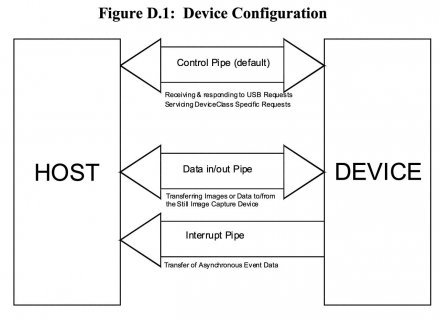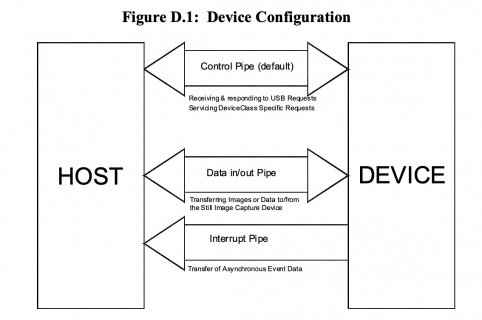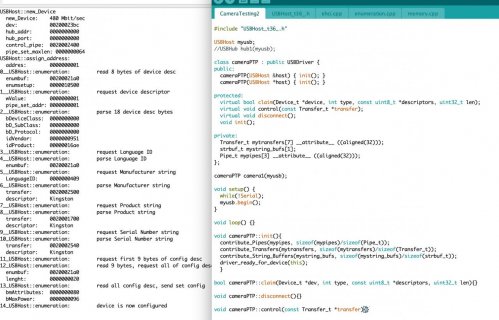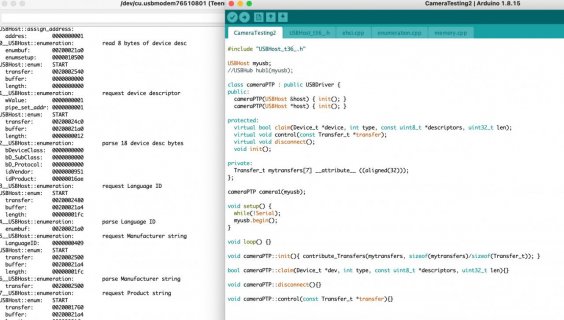/* USB EHCI Host for Teensy 3.6
* Copyright 2017 Paul Stoffregen (paul@pjrc.com)
*
* Permission is hereby granted, free of charge, to any person obtaining a
* copy of this software and associated documentation files (the
* "Software"), to deal in the Software without restriction, including
* without limitation the rights to use, copy, modify, merge, publish,
* distribute, sublicense, and/or sell copies of the Software, and to
* permit persons to whom the Software is furnished to do so, subject to
* the following conditions:
*
* The above copyright notice and this permission notice shall be included
* in all copies or substantial portions of the Software.
*
* THE SOFTWARE IS PROVIDED "AS IS", WITHOUT WARRANTY OF ANY KIND, EXPRESS
* OR IMPLIED, INCLUDING BUT NOT LIMITED TO THE WARRANTIES OF
* MERCHANTABILITY, FITNESS FOR A PARTICULAR PURPOSE AND NONINFRINGEMENT.
* IN NO EVENT SHALL THE AUTHORS OR COPYRIGHT HOLDERS BE LIABLE FOR ANY
* CLAIM, DAMAGES OR OTHER LIABILITY, WHETHER IN AN ACTION OF CONTRACT,
* TORT OR OTHERWISE, ARISING FROM, OUT OF OR IN CONNECTION WITH THE
* SOFTWARE OR THE USE OR OTHER DEALINGS IN THE SOFTWARE.
*/
#include <Arduino.h>
#include "USBHost_t36_.h" // Read this header first for key info
// USB devices are managed from this file.
// List of all connected devices, regardless of their status. If
// it's connected to the EHCI port or any port on any hub, it needs
// to be linked into this list.
static Device_t *devlist=NULL;
// List of all inactive drivers. At the end of enumeration, when
// drivers claim the device or its interfaces, they are removed
// from this list and linked into the list of active drivers on
// that device. When devices disconnect, the drivers are returned
// to this list, making them again available for enumeration of new
// devices.
static USBDriver *available_drivers = NULL;
// Static buffers used during enumeration. One a single USB device
// may enumerate at once, because USB address zero is used, and
// because this static buffer & state info can't be shared.
static uint8_t enumbuf[512] __attribute__ ((aligned(16)));
static setup_t enumsetup __attribute__ ((aligned(16)));
static uint16_t enumlen;
// True while any device is present but not yet fully configured.
// Only one USB device may be in this state at a time (responding
// to address zero) and using the enumeration static buffer.
volatile bool USBHost::enumeration_busy = false;
static void pipe_set_maxlen(Pipe_t *pipe, uint32_t maxlen);
static void pipe_set_addr(Pipe_t *pipe, uint32_t addr);
#define FPRINT
// The main user function to cause internal state to update. Since we do
// almost everything with DMA and interrupts, the only work to do here is
// call all the active driver Task() functions.
void USBHost::Task()
{
for (Device_t *dev = devlist; dev; dev = dev->next) {
for (USBDriver *driver = dev->drivers; driver; driver = driver->next) {
(driver->Task)();
}
}
}
// Drivers call this after they've completed initialization, so get themselves
// added to the list of inactive drivers available for new devices during
// enumeraton. Typically this is called from constructors, so hardware access
// or even printing debug messages should be avoided here. Just initialize
// lists and return.
//
void USBHost::driver_ready_for_device(USBDriver *driver)
{
driver->device = NULL;
driver->next = NULL;
if (available_drivers == NULL) {
available_drivers = driver;
} else {
// append to end of list
USBDriver *last = available_drivers;
while (last->next) last = last->next;
last->next = driver;
}
#ifdef FPRINT
Serial.print("USBHost::driver_ready_for_device"); Serial.printf(F(" driver: %10.10x\n"),driver);
#endif
}
// Create a new device and begin the enumeration process
//
Device_t * USBHost::new_Device(uint32_t speed, uint32_t hub_addr, uint32_t hub_port)
{
#ifdef FPRINT
Serial.println("USBHost::new_Device");
#endif
Device_t *dev;
#ifdef FPRINT
Serial.print(" new_Device: ");
switch (speed) {
case 0: Serial.print("12"); break;
case 1: Serial.print("1.5"); break;
case 2: Serial.print("480"); break;
default: Serial.print("??");
}
Serial.println(" Mbit/sec");
#endif
dev = allocate_Device();
if (!dev) return NULL;
memset(dev, 0, sizeof(Device_t));
dev->speed = speed;
dev->address = 0;
dev->hub_address = hub_addr;
dev->hub_port = hub_port;
dev->control_pipe = new_Pipe(dev, 0, 0, 0, 8);
if (!dev->control_pipe) {
free_Device(dev);
return NULL;
}
dev->strbuf = allocate_string_buffer(); // try to allocate a string buffer;
dev->control_pipe->callback_function = &enumeration;
dev->control_pipe->direction = 1; // 1=IN
// Here is where the enumeration process officially begins.
// Only a single device can enumerate at a time.
USBHost::enumeration_busy = true;
mk_setup(enumsetup, 0x80, 6, 0x0100, 0, 8); // 6=GET_DESCRIPTOR
queue_Control_Transfer(dev, &enumsetup, enumbuf, NULL);
if (devlist == NULL) {
devlist = dev;
} else {
Device_t *p;
for (p = devlist; p->next; p = p->next) ; // walk devlist
p->next = dev;
}
#ifdef FPRINT
Serial.printf(F(" dev: %10.10x\n"),dev);
Serial.printf(F(" hub_addr: %10.10x\n"),hub_addr);
Serial.printf(F(" hub_port: %10.10x\n"),hub_port);
Serial.printf(F(" control_pipe: %10.10x\n"),dev->control_pipe);
#endif
return dev;
}
// Control transfer callback function. ALL control transfers from all
// devices call this function when they complete. When control transfers
// are created by drivers, the driver is called to handle the result.
// Otherwise, the control transfer is part of the enumeration process,
// which is implemented here.
//
void USBHost::enumeration(const Transfer_t *transfer)
{
#ifdef FPRINT
Serial.println("USBHost::enum: START");
Serial.printf(F(" transfer: %10.10x\n"),transfer);
Serial.printf(F(" buffer: %10.10x\n"),transfer->buffer);
Serial.printf(F(" length: %10.10x\n"),transfer->length);
#endif
Device_t *dev;
uint32_t len;
// If a driver created this control transfer, allow it to process the result
if (transfer->driver) {
transfer->driver->control(transfer);
return;
}
//print_hexbytes(transfer->buffer, transfer->length);
dev = transfer->pipe->device;
while (1) {
// Within this large switch/case, "break" means we've done
// some work, but more remains to be done in a different
// state. Generally break is used after parsing received
// data, but what happens next could be different states.
// When completed, return is used. Generally, return happens
// only after a new control transfer is queued, or when
// enumeration is complete and no more communication is needed.
switch (dev->enum_state) {
case 0: // read 8 bytes of device desc, set max packet, and send set address
pipe_set_maxlen(dev->control_pipe, enumbuf[7]);
mk_setup(enumsetup, 0, 5,assign_address() , 0, 0); // 5=SET_ADDRESS
queue_Control_Transfer(dev, &enumsetup, NULL, NULL);
#ifdef FPRINT
Serial.print("0__USBHost::enumeration: "); Serial.println(" read 8 bytes of device desc");
Serial.printf(F(" enumbuf: %10.10x\n"),enumbuf);
Serial.printf(F(" enumsetup: %10.10x\n"),enumsetup);
#endif
dev->enum_state = 1;
return;
case 1: // request 18 device device descriptor
#ifdef FPRINT
Serial.print("1__USBHost::enumeration: ");Serial.println("request device descriptor");
Serial.printf(F(" wValue: %10.10x\n"),enumsetup.wValue);
#endif
dev->address = enumsetup.wValue;
pipe_set_addr(dev->control_pipe, enumsetup.wValue);
mk_setup(enumsetup, 0x80, 6, 0x0100, 0, 18); // 6=GET_DESCRIPTOR
queue_Control_Transfer(dev, &enumsetup, enumbuf, NULL);
dev->enum_state = 2;
return;
case 2: // parse 18 device desc bytes
print_device_descriptor(enumbuf);
dev->bDeviceClass = enumbuf[4];
dev->bDeviceSubClass = enumbuf[5];
dev->bDeviceProtocol = enumbuf[6];
dev->idVendor = enumbuf[8] | (enumbuf[9] << 8);
dev->idProduct = enumbuf[10] | (enumbuf[11] << 8);
enumbuf[0] = enumbuf[14];
enumbuf[1] = enumbuf[15];
enumbuf[2] = enumbuf[16];
#ifdef FPRINT
Serial.print("2__USBHost::enumeration: ");Serial.println("parse 18 device desc bytes");
Serial.printf(F(" bDeviceClass: %10.10x\n"),dev->bDeviceClass);
Serial.printf(F(" bD_SubClass: %10.10x\n"),dev->bDeviceSubClass);
Serial.printf(F(" bD_Protocol: %10.10x\n"),dev->bDeviceProtocol);
Serial.printf(F(" idVendor: %10.10x\n"),dev->idVendor);
Serial.printf(F(" idProduct: %10.10x\n"),dev->idProduct);
#endif
if ((enumbuf[0] | enumbuf[1] | enumbuf[2]) > 0) {
dev->enum_state = 3;
} else {
dev->enum_state = 11;
}
break;
case 3: // request Language ID
#ifdef FPRINT
Serial.print("3__USBHost::enumeration: "); Serial.println("request Language ID");
#endif
len = sizeof(enumbuf) - 4;
mk_setup(enumsetup, 0x80, 6, 0x0300, 0, len); // 6=GET_DESCRIPTOR
queue_Control_Transfer(dev, &enumsetup, enumbuf + 4, NULL);
dev->enum_state = 4;
return;
case 4: // parse Language ID
#ifdef FPRINT
Serial.print("4__USBHost::enumeration: ");Serial.println("parse Language ID");
Serial.printf(F(" enumbuf: %10.10x\n"),enumbuf);
#endif
if (enumbuf[4] < 4 || enumbuf[5] != 3) {
dev->enum_state = 11;
} else {
dev->LanguageID = enumbuf[6] | (enumbuf[7] << 8);
if (enumbuf[0]) dev->enum_state = 5;
else if (enumbuf[1]) dev->enum_state = 7;
else if (enumbuf[2]) dev->enum_state = 9;
else dev->enum_state = 11;
}
break;
case 5: // request Manufacturer string
len = sizeof(enumbuf) - 4;
mk_setup(enumsetup, 0x80, 6, 0x0300 | enumbuf[0], dev->LanguageID, len);
queue_Control_Transfer(dev, &enumsetup, enumbuf + 4, NULL);
#ifdef FPRINT
Serial.print("5__USBHost::enumeration: "); Serial.println("request Manufacturer string");
Serial.printf(F(" LanguageID: %10.10x\n"),dev->LanguageID);
#endif
dev->enum_state = 6;
return;
case 6: // parse Manufacturer string
#ifdef FPRINT
Serial.print("6__USBHost::enumeration: ");Serial.println("parse Manufacturer string");
Serial.printf(F(" transfer: %10.10x\n"),transfer);
#endif
print_string_descriptor("Manufacturer: ", enumbuf + 4);
convertStringDescriptorToASCIIString(0, dev, transfer);
// TODO: receive the string...
if (enumbuf[1]) dev->enum_state = 7;
else if (enumbuf[2]) dev->enum_state = 9;
else dev->enum_state = 11;
break;
case 7: // request Product string
#ifdef FPRINT
Serial.print("7__USBHost::enumeration: ");Serial.println("request Product string");
#endif
len = sizeof(enumbuf) - 4;
mk_setup(enumsetup, 0x80, 6, 0x0300 | enumbuf[1], dev->LanguageID, len);
queue_Control_Transfer(dev, &enumsetup, enumbuf + 4, NULL);
dev->enum_state = 8;
return;
case 8: // parse Product string
#ifdef FPRINT
Serial.print("8__USBHost::enumeration: ");Serial.println("parse Product string");
Serial.printf(F(" transfer: %10.10x\n"),transfer);
#endif
print_string_descriptor("Product: ", enumbuf + 4);
convertStringDescriptorToASCIIString(1, dev, transfer);
if (enumbuf[2]) dev->enum_state = 9;
else dev->enum_state = 11;
break;
case 9: // request Serial Number string
#ifdef FPRINT
Serial.print("9__USBHost::enumeration: "); Serial.println("request Serial Number string");
#endif
len = sizeof(enumbuf) - 4;
mk_setup(enumsetup, 0x80, 6, 0x0300 | enumbuf[2], dev->LanguageID, len);
queue_Control_Transfer(dev, &enumsetup, enumbuf + 4, NULL);
dev->enum_state = 10;
return;
case 10: // parse Serial Number string
#ifdef FPRINT
Serial.print("10_USBHost::enumeration: "); Serial.println("parse Serial Number string");
Serial.printf(F(" transfer: %10.10x\n"),transfer);
#endif
print_string_descriptor("Serial Number: ", enumbuf + 4);
convertStringDescriptorToASCIIString(2, dev, transfer);
dev->enum_state = 11;
break;
case 11: // request first 9 bytes of config desc
#ifdef FPRINT
Serial.print("11_USBHost::enumeration: "); Serial.println("request first 9 bytes of config desc");
#endif
mk_setup(enumsetup, 0x80, 6, 0x0200, 0, 9); // 6=GET_DESCRIPTOR
queue_Control_Transfer(dev, &enumsetup, enumbuf, NULL);
dev->enum_state = 12;
return;
case 12: // read 9 bytes, request all of config desc
enumlen = enumbuf[2] | (enumbuf[3] << 8);
#ifdef FPRINT
Serial.print("12_USBHost::enumeration: "); Serial.println("read 9 bytes, request all of config desc");
Serial.printf(F(" enumbuf: %10.10x\n"),enumbuf);
Serial.printf(F(" lenght: %10.10x\n"),enumlen);
#endif
if (enumlen > sizeof(enumbuf)) {
enumlen = sizeof(enumbuf);
// TODO: how to handle device with too much config data
}
mk_setup(enumsetup, 0x80, 6, 0x0200, 0, enumlen); // 6=GET_DESCRIPTOR
queue_Control_Transfer(dev, &enumsetup, enumbuf, NULL);
dev->enum_state = 13;
return;
case 13: // read all config desc, send set config
print_config_descriptor(enumbuf, sizeof(enumbuf));
dev->bmAttributes = enumbuf[7];
dev->bMaxPower = enumbuf[8];
// TODO: actually do something with interface descriptor?
mk_setup(enumsetup, 0, 9, enumbuf[5], 0, 0); // 9=SET_CONFIGURATION
queue_Control_Transfer(dev, &enumsetup, NULL, NULL);
#ifdef FPRINT
Serial.print("13_USBHost::enumeration: "); Serial.println("read all config desc, send set config");
Serial.printf(F(" bmAttributes: %10.10x\n"),dev->bmAttributes);
Serial.printf(F(" bMaxPower: %10.10x\n"),dev->bMaxPower);
#endif
dev->enum_state = 14;
return;
case 14: // device is now configured
#ifdef FPRINT
Serial.print("14_USBHost::enumeration: "); Serial.println("device is now configured");
#endif
claim_drivers(dev);
dev->enum_state = 15;
// unlock exclusive access to enumeration process. If any
// more devices are waiting, the hub driver is responsible
// for resetting their ports and starting their enumeration
// when the port enables.
USBHost::enumeration_busy = false;
return;
case 15: // control transfers for other stuff?
#ifdef FPRINT
Serial.print("15_USBHost::enumeration: "); Serial.println("control transfers for other stuff?");
#endif
// TODO: handle other standard control: set/clear feature, etc
default:
return;
}
}
}
void USBHost::convertStringDescriptorToASCIIString(uint8_t string_index, Device_t *dev, const Transfer_t *transfer) {
strbuf_t *strbuf = dev->strbuf;
if (!strbuf) return; // don't have a buffer
uint8_t *buffer = (uint8_t*)transfer->buffer;
uint8_t buf_index = string_index? strbuf->iStrings[string_index]+1 : 0;
// Try to verify - The first byte should be length and the 2nd byte should be 0x3
if (!buffer || (buffer[1] != 0x3)) {
return; // No string so can simply return
}
strbuf->iStrings[string_index] = buf_index; // remember our starting positio
uint8_t count_bytes_returned = buffer[0];
if ((buf_index + count_bytes_returned/2) >= DEVICE_STRUCT_STRING_BUF_SIZE)
count_bytes_returned = (DEVICE_STRUCT_STRING_BUF_SIZE - buf_index) * 2;
// Now copy into our storage buffer.
for (uint8_t i = 2; (i < count_bytes_returned) && (buf_index < (DEVICE_STRUCT_STRING_BUF_SIZE -1)); i += 2) {
strbuf->buffer[buf_index++] = buffer[i];
}
strbuf->buffer[buf_index] = 0; // null terminate.
// Update other indexes to point to null character
while (++string_index < 3) {
strbuf->iStrings[string_index] = buf_index; // point to trailing NULL character
}
Serial.printf(F(" descriptor: %10.10s\n"),strbuf->buffer);
}
void USBHost::claim_drivers(Device_t *dev)
{
USBDriver *driver, *prev=NULL;
// first check if any driver wishes to claim the entire device
for (driver=available_drivers; driver != NULL; driver = driver->next) {
if (driver->device != NULL) continue;
if (driver->claim(dev, 0, enumbuf + 9, enumlen - 9)) {
if (prev) {
prev->next = driver->next;
} else {
available_drivers = driver->next;
}
driver->device = dev;
driver->next = NULL;
dev->drivers = driver;
return;
}
prev = driver;
}
// parse interfaces from config descriptor
const uint8_t *p = enumbuf + 9;
const uint8_t *end = enumbuf + enumlen;
while (p < end) {
uint8_t desclen = *p;
uint8_t desctype = *(p+1);
#ifdef FPRINT
Serial.println("USBHost::claim_drivers: ");
Serial.printf(F(" Descriptor: %10.10x"),desctype);
Serial.print(" = ");
if (desctype == 4) Serial.println("INTERFACE");
else if (desctype == 5) Serial.println("ENDPOINT");
else if (desctype == 6) Serial.println("DEV_QUALIFIER");
else if (desctype == 7) Serial.println("OTHER_SPEED");
else if (desctype == 11) Serial.println("IAD");
else if (desctype == 33) Serial.println("HID");
else Serial.println(" ???");
#endif
if (desctype == 11 && desclen == 8) {
// TODO: parse IAD, ask drivers for claim
// TODO: how to skip over all interfaces IAD represented
}
if (desctype == 4 && desclen == 9) {
// found an interface, ask available drivers if they want it
prev = NULL;
for (driver=available_drivers; driver != NULL; driver = driver->next) {
if (driver->device != NULL) continue;
// TODO: should parse ahead and give claim()
// an accurate length. (end - p) is the rest
// of ALL descriptors, likely more interfaces
// this driver has no business parsing
if (driver->claim(dev, 1, p, end - p)) {
// this driver claims iface
// remove it from available_drivers list
if (prev) {
prev->next = driver->next;
} else {
available_drivers = driver->next;
}
// add to list of drivers using this device
driver->next = dev->drivers;
dev->drivers = driver;
driver->device = dev;
// not done, may be more interface for more drivers
}
prev = driver;
}
}
p += desclen;
}
}
static bool address_in_use(uint32_t addr)
{
for (Device_t *p = devlist; p; p = p->next) {
if (p->address == addr) return true;
}
return false;
}
uint32_t USBHost::assign_address(void)
{
static uint8_t last_assigned_address=0;
uint32_t addr = last_assigned_address;
while (1) {
if (++addr > 127) addr = 1;
if (!address_in_use(addr)) {
last_assigned_address = addr;
#ifdef FPRINT
Serial.println("USBHost::assign_address: "); Serial.printf(F(" addres: %10.10x\n"),addr);
#endif
return addr;
}
}
}
static void pipe_set_maxlen(Pipe_t *pipe, uint32_t maxlen)
{
#ifdef FPRINT
Serial.printf(F(" pipe_set_maxlen: %10.10d\n"),maxlen);
#endif
pipe->qh.capabilities[0] = (pipe->qh.capabilities[0] & 0xF800FFFF) | (maxlen << 16);
}
static void pipe_set_addr(Pipe_t *pipe, uint32_t addr)
{
#ifdef FPRINT
Serial.printf(F(" pipe_set_addr: %10.10d\n"),addr);
#endif
pipe->qh.capabilities[0] = (pipe->qh.capabilities[0] & 0xFFFFFF80) | addr;
}
void USBHost::disconnect_Device(Device_t *dev)
{
#ifdef FPRINT
Serial.printf(F("USBHost::disconnect_Device: %10.10x\n"),dev);
#endif
if (!dev) return;
// Disconnect all drivers using this device. If this device is
// a hub, the hub driver is responsible for recursively calling
// this function to disconnect its downstream devices.
print_driverlist("available_drivers", available_drivers);
print_driverlist("dev->drivers", dev->drivers);
for (USBDriver *p = dev->drivers; p; ) {
#ifdef FPRINT
Serial.printf(F("disconnect driver: %10.10x\n"),p);
#endif
p->disconnect();
p->device = NULL;
USBDriver *next = p->next;
p->next = available_drivers;
available_drivers = p;
p = next;
}
print_driverlist("available_drivers", available_drivers);
// delete all the pipes
for (Pipe_t *p = dev->data_pipes; p; ) {
Pipe_t *next = p->next;
delete_Pipe(p);
p = next;
}
delete_Pipe(dev->control_pipe);
// remove device from devlist and free its Device_t
Device_t *prev_dev = NULL;
for (Device_t *p = devlist; p; p = p->next) {
if (p == dev) {
if (prev_dev == NULL) {
devlist = p->next;
} else {
prev_dev->next = p->next;
}
#ifdef FPRINT
Serial.println("removed Device_t from devlist");
#endif
if (p->strbuf != nullptr ) {
free_string_buffer(p->strbuf);
}
free_Device(p);
break;
}
prev_dev = p;
}
}






